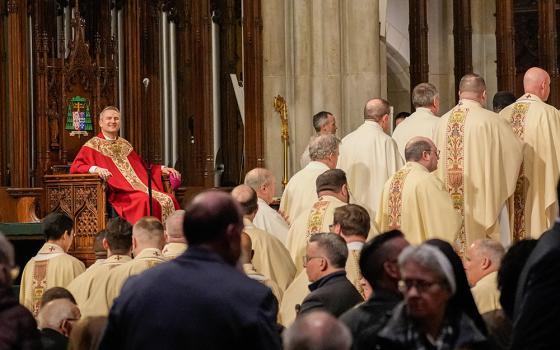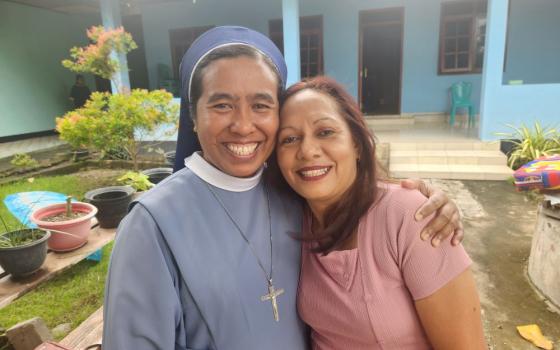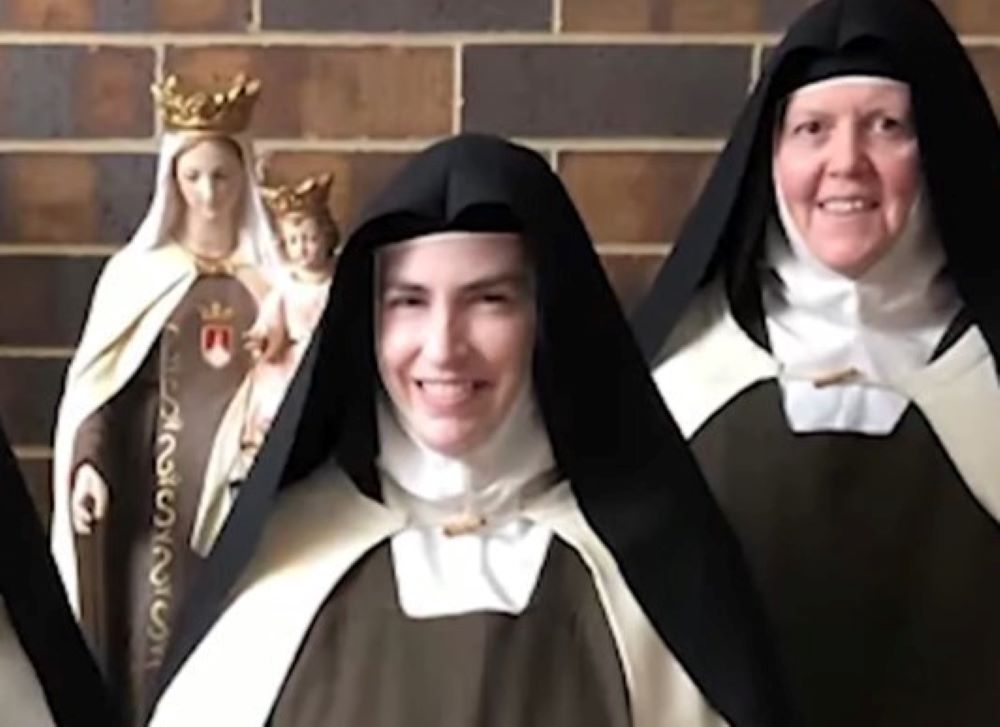
Mother Superior Teresa Agnes Gerlach, front, and another member of the Order of Discalced Carmelite in Arlington, Texas, are pictured in this undated photo featured in a CBS News Texas story June 8. Fort Worth Bishop Michael Owens has accused Gerlach of breaking her vow of chastity with an unnamed priest outside the diocese and removed her from the order. Gerlach has denied the allegation and said the bishop does not have the authority to take such action. (GSR screenshot/CBS News Texas)
The allegations are extreme: Adultery, abuse of power, marijuana usage, defamation, lies, theft, scandal and a conspiracy to take valuable monastery land.
The questions are many: What really happened? Has the process been done correctly? What did Vatican officials know, and when did they know it? And why was the bishop at the center of the storm put in charge?
The issues are complex: They involve Texas civil law, criminal law, canon law, papal decrees, congregational constitutions, hierarchical authority and investigatory powers — to name just a few.
And all this over a tiny monastery of 10 Carmelite nuns and the local bishop.
He said, she said accusations
According to court documents, interviews and press reports, the maelstrom began April 24, when Bishop Michael Olson, head of the Catholic Diocese of Fort Worth, Texas, arrived at the Monastery of the Most Holy Trinity, home to the Discalced Carmelite Nuns, in Arlington.
Bishop Michael Olson of Fort Worth, Texas, leads the morning prayer Sept. 21, 2018, during the Fifth National Encuentro, or V Encuentro, in Grapevine, Texas. (OSV News/CNS file/Tyler Orsburn)
Mother Superior Teresa Agnes Gerlach and Sr. Francis Therese allege in their lawsuit against Olson that upon his arrival, which came with just 30 minutes notice, he demanded Gerlach's computer, iPad and cellphone. Olson had brought with him a monsignor, the diocesan chancellor, and a male forensic technology expert, whom he allowed into the papal enclosure, they allege, and then spent two hours interrogating Sr. Francis Therese.
The next day, April 25, they allege, Olson was back and interviewed four sisters for several hours. That same day, Gerlach, who uses a wheelchair, underwent a surgical procedure where she was put under general anesthesia and given fentanyl. When she returned to the monastery, Olson interrogated her even though she was in pain and heavily medicated, she said in an affidavit. On April 26, she said, Olson returned to interview the rest of the sisters, but the sisters told the bishops they would be made available once they were informed of the purpose, object and scope of the questioning.
"The Bishop threw a temper tantrum, and in an agitated and raised voice yelled that the Monastery was shut down, no Mass would be celebrated, he then slammed the door and left the Monastery, traumatizing the Sisters," the sworn affidavit says.
And then things really began to spiral.
According to court documents filed by the diocese, Olson sent a letter the same day of the alleged tantrum appointing a canon lawyer for Gerlach "in order to protect her continuing rights during the investigation into misconduct" until she selected her own for his approval. The next day, April 27, documents show, Olson wrote that he had received an email from Gerlach's chosen canon lawyer after he had already sent the decree naming Michael Podhajsky.
In any case, he did not approve her choice. "Accordingly, unless and until such time as a mandate is presented for a canon lawyer whom I can approve to assist you in this grave matter, Mr. Podhajsky will continue to serve ex officio as your advocate," Olson wrote.
Podhajsky remains Gerlach's only canon lawyer. Attorney Matthew Bobo of Fort Worth is representing her in civil matters.
On May 11, Podhajsky, along with the diocese's canon lawyer, signed a stipulation allowing mirror images to be made of all the data stored on the confiscated devices. Bobo contends Podhajsky has never spoken to his client, The Dallas Morning News reported.
On April 28, Olson sent another letter, documents show, noting that Gerlach was texting from a new phone and that it had come to his attention she had also been using Sr. Francis Therese's phone.
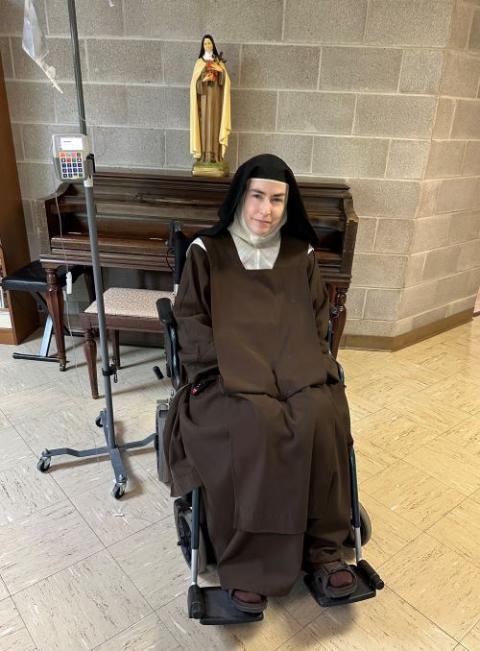
Reverend Mother Teresa Agnes of Jesus Crucified Gerlach, a longtime member of the Order of Discalced Carmelites, is pictured in this undated photo at the Monastery of the Most Holy Trinity in Arlington, Texas. (OSV News/Courtesy of Matthew Bobo)
"We never gave anyone permission to access our account or be able to look at our phones or perform any type of surveillance on us," Gerlach said in her affidavit. Olson's letter notes that he has placed Gerlach on administrative leave and that "I am the current superior."
He reiterates in the letter that there will be no daily Mass at the monastery, and while he will allow a Sunday Mass, it will be for the sisters only. Gerlach says in her filings that about 60 lay people typically attend Sunday Masses at the monastery.
"I also remind you that you are not to invite any priest to celebrate Mass at the Carmel without my permission and without them receiving faculties from me along with a letter of good standing from the priest's duly appointed superior," his letter says.
Eventually, Gerlach and Bobo say, Olson rejected three of her choices for a canon lawyer and kept his choice in place. Only then, they say, did they go to court.
On May 3, Gerlach and Sr. Francis Therese filed a lawsuit in Tarrant County District Court against Olson and the Fort Worth Diocese, alleging Olson had invaded their privacy and taken their personal property. They asked the court for a declaration that Olson and the diocese have no authority to seize their property or access their technology, for their devices to be returned, injunctions stopping Olson and the diocese from any type of contact with the sisters except through legal counsel, and damages of at least $1 million.
Olson and the diocese argue in their filings that the court should toss the suit because it would require wading into ecclesial matters that are outside its jurisdiction. The nuns' requests for temporary injunctions were denied in hearings May 8 and May 10.
At that point, it appears that the conflict still had not reached the public, although the monastery's devoted Mass attendees knew something was wrong. That all changed May 16, when Olson issued a statement on the homepage of the diocesan website saying Gerlach had committed adultery:
Bishop Michael Olson received a report in April 2023 that the Reverend Mother Teresa Agnes of Jesus Crucified Gerlach, O.C.D., committed sins against the Sixth Commandment and violated her vow of chastity with a priest from outside the Diocese of Fort Worth. The priest's superiors have been notified. An ecclesiastical investigation into the report of the grave misconduct was initiated at the Monastery of the Most Holy Trinity in Arlington, Texas, on April 24, 2023. During this time, Mass is being offered for the sisters on Sundays. The Reverend Mother Teresa Agnes has responded by initiating civil litigation against Bishop Olson and the Diocese of Fort Worth. Please pray for the sisters at the Monastery.
The statement does not name the priest, or his diocese, who Olson says had sex with Gerlach.
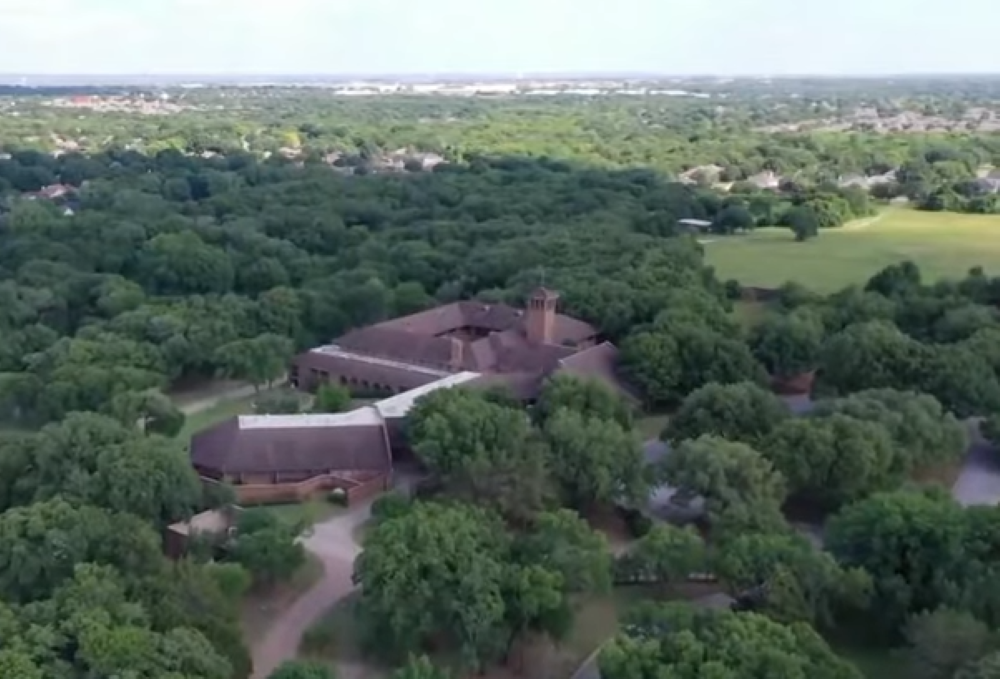
The Monastery of the Most Holy Trinity, home to the Discalced Carmelite Nuns in Arlington, Texas. (GSR screenshot/CBS News Texas)
Once Olson issued the statement, the case hit the news. And then the now very public accusations began to fly.
Gerlach's attorney alleged to the Daily Mail that Olson wanted the nuns' electronic devices because they contained the order's donor list.
"And that is a list that the bishop has been trying to get his hands on since he became bishop," Bobo told the British newspaper. He also alleged that Olson was attempting to take the nuns' property, which consists of about 72 forested acres amidst the sprawling metropolis of Dallas and Fort Worth. County records show the property is worth at least $5 million; Bobo says developers would be willing to pay four times that.
"He could arguably have the monastery shut down, and then that piece of property, which is worth about $22 million, could become part of the diocese," Bobo told the Daily Mail. He made the same allegation to Insider.com: "They're 72 acres in Arlington, Texas, on the Trinity River in the middle of the metroplex. It's worth $20 million or so. That's what he's trying to do."
Advertisement
Diocesan spokesman Pat Svacina has denied all Bobo's claims, and in a June 7 statement blasted the attorney's many press releases and statements.
"Bishop Olson and the Diocese have taken the approach that this is an internal matter and should not be played out in the press," the diocesan statement says in an email sent to GSR.
Bobo flatly denies Gerlach violated her vow of chastity or broke the Sixth Commandment, which forbids adultery, noting that she has spent decades in a cloister and has likely only been around four or five men in the last 25 years.
The diocese's court filing alleges Gerlach admitted to the sins; Bobo says Gerlach was questioned while so heavily medicated that she cannot remember what she said.
"She did not have sex with a priest," Bobo told the Dallas Morning News.
In a May 26 letter to the nuns, Insider.com reports that Olson said he would not reinstate daily Mass and confession at the monastery because the sisters were pushing "a false narrative relative to the pending investigation, which has led to local, national, and international media coverage and has incited hatred and animosity against me." The letter said he would continue to withhold the sacraments until the lawsuit was withdrawn or finished and they "cease this behavior which is contrary to and unbecoming of their religious state and demonstrate love for and obedience to Holy Church," the news site said.
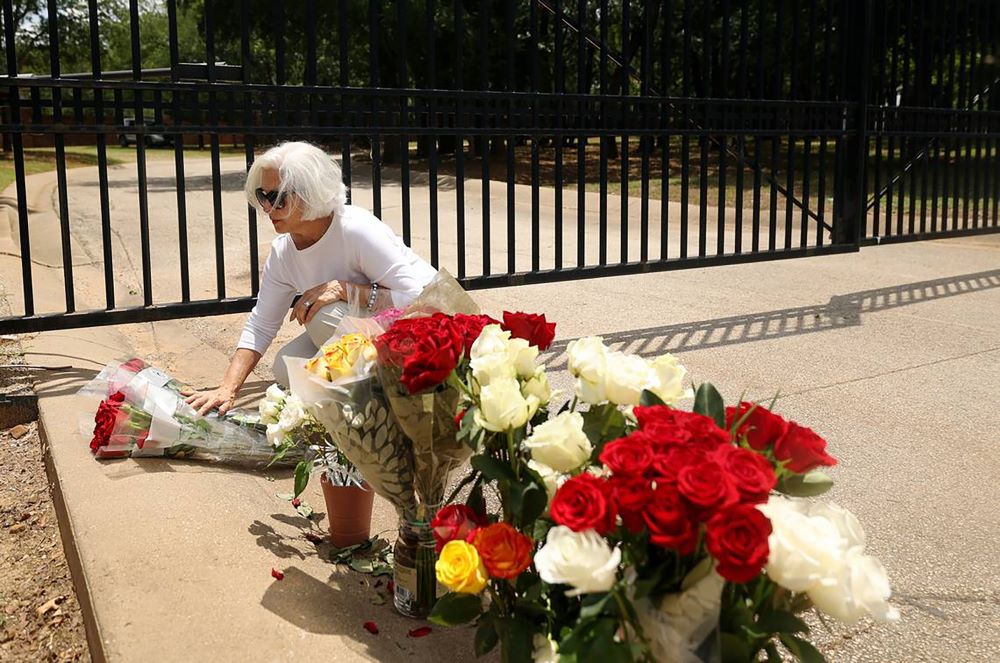
Janice Vonada of Keller, Texas, places roses at the gate to the Monastery of the Most Holy Trinity of the Discalced Carmelite Nuns of Arlington in Arlington, Texas, May 31. Vonada was among about 100 other supporters who prayed for the sisters at a nearby park. (TNS/Fort Worth Star-Telegram/Amanda McCoy)
On May 31, the Ladies Auxiliary to the Discalced Carmelite Nuns held a public prayer service in a park for the nuns, then went to the gates of the monastery to lay flowers, CBS News Texas reported. The group, which provides financial support and helps with groceries for the congregation, said on its Facebook page 102 people attended the event.
They didn't know that while they were showing their support, Vatican officials were putting Olson in charge.
Olson's 'full governing powers'
In a decree dated May 31, the Vatican Dicastery for Institutes of Consecrated Life and Societies of Apostolic Life appointed Olson as pontifical commissary for the congregation — essentially making him the major superior of the order.
The decree, signed by the congregation's secretary, Archbishop José Rodríguez Carballo, not only granted Olson "full governing powers," but also put a stamp of validity on every action Olson had taken so far, saying they were sanated, or deemed valid: "This Dicastery also sanates all the administrative and legal acts already performed" the decree says.
The diocesan statement announcing the appointment said the Vatican had confirmed that "As Pontifical Commissary, Bishop Olson is the Pope's representative in this matter. In doing so, the Dicastery recognized and acknowledged that Bishop Olson has been, and continues to be, entrusted with full governing responsibility for the Monastery."
It went on to say the appointment came because the nuns had questioned his authority, and it reiterated the allegations against Gerlach. "This decree is in response to the challenge to Bishop Olson's authority to conduct an investigation into the admitted-to violations of the sixth commandment of the Decalogue and the vow of chastity by the Reverend Mother Teresa Agnes (Gerlach) of Jesus Crucified, O.C.D., Prioress of the Monastery in Arlington, Texas," it says. "Please pray for all the sisters and for Bishop Olson."
On June 1, Olson announced he had found Gerlach guilty and was using his authority as pontifical commissary to kick her out of the order. In a separate statement, he said that now that Gerlach was dismissed, he would reinstate daily Mass starting June 7, but "given the pending lawsuit, Mass will remain closed to the participation of the lay faithful."
The next day, June 2, the nuns' lawsuit was amended to add defamation and theft of their electronic data.
"On May 16, 2023, the Defendants made the decision to go outside the supposedly confidential ecclesiastical process and put this matter out into the public forum" alleging adultery and violation of her vows and "grave misconduct," the filing states. "These statements were voluntarily put out in the public forum and are patently false and defamatory."
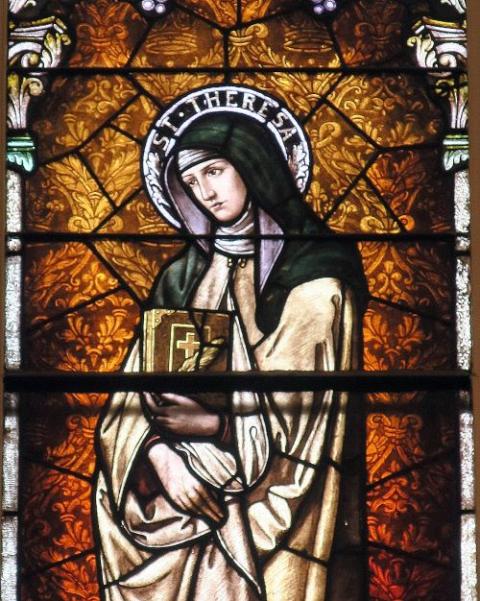
St. Teresa of Avila, who founded the convent of Discalced Carmelite Nuns in 1562, is depicted in a detail of a stained glass window at Holy Rosary Catholic Church in Indianapolis, Indiana. The Foundation of Carmel in Fort Worth, Texas, dates to 1958. (Wikimedia Commons/CC BY-SA 4.0/Nheyob)
But the twists and turns continued.
On June 7, news broke that Arlington police are conducting a criminal investigation of Olson and the diocese. The diocese responded by saying the Arlington police were investigating the Carmelites "regarding the use of marijuana and edibles at the monastery, along with other issues that the Diocese will address at another time and in a proper forum."
The statement included two photos that it said were taken by "a confidential informant within the monastery." The digital photos do not contain metadata that would show when or where they were taken, but show a table and counter covered with various forms of marijuana, edibles containing the hallucinogenic chemicals from marijuana, smoking instruments and vaping products. Marijuana is illegal in Texas except under strict medical conditions.
In a statement emailed to GSR, Bobo called the allegations of drug use "absolutely ridiculous," saying the photos "could have easily been staged and doctored by anyone, and from anywhere," and that they are "a mere obfuscation ploy and a juvenile, low-level public relations stunt by the diocese to attempt to misdirect the attention from the real issues."
Svacina's statement said Bobo's announcement of a criminal investigation "is yet another transparent attempt to spread baseless and outrageous accusations regarding Bishop Olson's legitimate investigation of the Carmelite Monastery. Attorney Bobo's unilateral press releases are all designed to attempt to embarrass Bishop Olson and undermine his authority."
Scavina's statement also denied any wrongdoing.
"To be perfectly clear, neither the Bishop nor anyone at the Diocese have been involved in any criminal activity regarding the Monastery. For Attorney Bobo or anyone else to suggest otherwise is preposterous," the statement says. "The mere fact that Attorney Bobo initiated and made a report to the Arlington Police Department was not unexpected given the aggressive manner he has litigated this ecclesiastical dispute in the press" and that "the Bishop is tirelessly working to address with law enforcement and in private in accordance with canonical norms and within his authority as Bishop of the Diocese of Fort Worth and as Pontifical Commissary."
Those canonical norms are also in question.
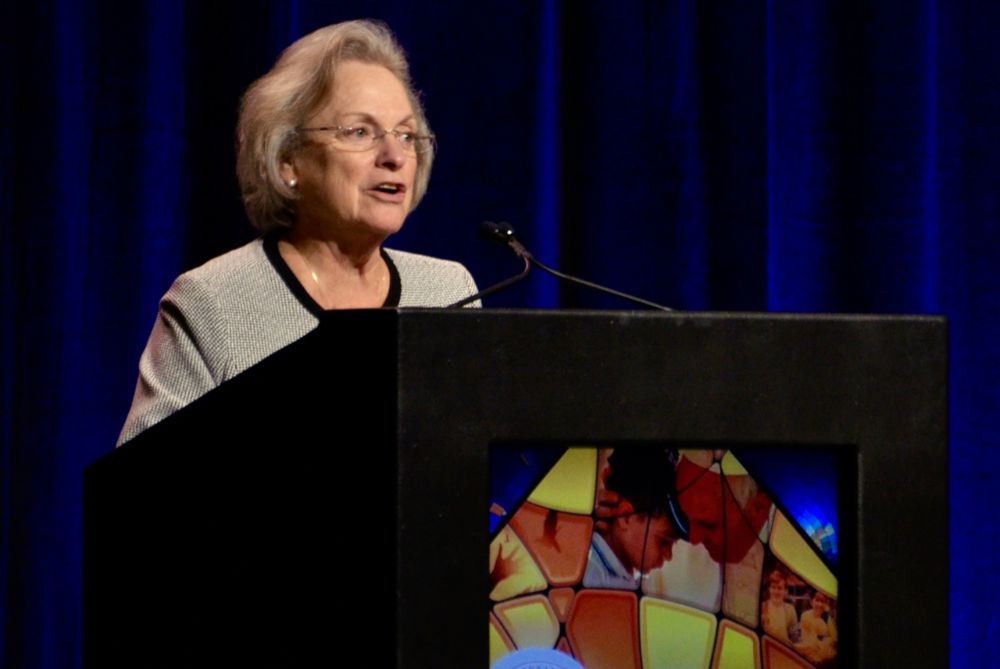
Mercy Sr. Sharon Euart, executive director of the Resource Center for Religious Institutes, addresses the group's annual conference Oct. 1 in Dallas. (GSR photo/Dan Stockman)
More questions than answers
Even experts in canon law and the Vatican rules regarding contemplative orders say there are far more questions than answers in the case.
"All you have to go on is what her attorney says and what the diocese says," Sr. Sharon Euart told Global Sisters Report. Euart, a Sister of Mercy, is a canon lawyer, executive director of the Resource Center for Religious Institutes and former executive coordinator of the Canon Law Society of America. "There are all these questions no one seems to have an answer to."
Euart said that since the congregation is of pontifical right, meaning it was established by the authority of the pope, not the bishop, the next highest authority after the major superior would be the federation the congregation belongs to, and after that would be the supreme moderator of the order, in this case the male Carmelite generalate in Rome. So any investigation of wrongdoing should have gone through the Carmelites, not the local bishop who generally has only pastoral authority over religious congregations in his diocese.
"Why it was the bishop and not the Carmelites, I don't know how we answer that," Euart said. The Vatican document Cor Orans ("Praying Heart") "says what the procedure is — why it was modified we do not know, and who initiated the changes we don't know."
There are four federations — the Carmelites call them associations — of Carmelites in the United States, but the Arlington monastery is not listed as a member on any of their websites. The monastery's website included a link to the St. Teresa Association, web archives show, but that link disappeared from the site in 2015. Cor Orans, published in 2018, requires all contemplative orders to be in a federation.
Without a federation, she said, the matter should have gone either to an associated order of male Carmelites or the Carmelite fathers in Rome.
"But it would not, according to Cor Orans, go directly to the dicastery or certainly not to the bishop," Euart said. "If that was modified, it's not clear on what grounds that would happen."
She also said it is unclear why the bishop would or could deny Gerlach the canon lawyer of her choice.
"With some priests on abuse cases, they have to get the bishop's approval of their canon lawyer, but this is not an abuse case," Euart said. Being unable to choose her canon lawyer could be cause for an appeal of Gerlach's dismissal.
"If the individual doesn't identify a canon lawyer, their superior would get one for them," she said. "This difference here is the superior is now in an adversarial position with the sister."
That adversarial position is because Olson, who was investigating Gerlach, is now her superior. And everything Olson did in the process has now been validated by the Vatican.
Vatican officials did not immediately respond to a question from Global Sisters Report on why Olson was named pontifical commissary.
'All you have to go on is what her attorney says and what the diocese says.'
—Sr. Sharon Euart
Many also question how a cloistered nun who uses a wheelchair and a feeding tube could have had a sexual relationship with a priest from another diocese.
"Was she taken advantage of? If, in fact, something happened? Did she give consent? Was she even aware of what was happening?" Euart asked. "We don't know if it was consensual, or an abuse of power with an adult. We don't know the circumstances. She's denying it happened. … They don't go out (of the monastery) at all, and she's in a wheelchair."
It is unknown who, if anyone, is investigating the actions of the unnamed priest Gerlach is alleged to have sinned with.
Benedictine Sr. Nancy Bauer of St. Benedict's Monastery in St. Joseph, Minnesota, said one section of Cor Orans is ambiguous on when and how the local bishop can intervene in the matters of a monastery of contemplative nuns. Bauer is a canon lawyer and former professor of canon law at the Catholic University of America in Washington, D.C., specializing in consecrated life.
The section (Chapter 1, Section VII, Part 83.B) says "the diocesan Bishop, on the occasion of the pastoral visit or other paternal visits and even in case of necessity, can provide appropriate solutions himself when he finds that there are abuses and after appeals made to the Major Superior have had no effect."
"I would interpret that as, if the bishop of the diocese discovers something inappropriate at the monastery, he can intervene," said Bauer, who is the president of the Monastic Congregation of St. Benedict. "But usually that would be referred to the Holy See."
There are also questions about Gerlach's dismissal: Euart notes that priests found to have committed adultery and violated their vow of chastity are not typically dismissed. Bauer said canon law calls for dismissal of a religious who violates the Sixth Commandment in certain circumstances, but only when the religious "persists" in the violation, even after a warning, and it is "external" or "public." In other words, it is causing scandal among the faithful.
"It's one thing to say a man or a woman did something, but to say a nun did — you just don't do that," Bauer said. "Even if something is being investigated, canonically you don't broadcast that. That would be a really grave violation."




